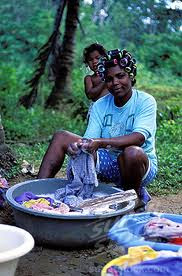 Wash day here is not one of my favourite days. In England I didn't really have a wash day. When there was a pile of clothes to be washed you just threw them into the automatic washing machine, switched it on and left it. Then later in the day into the tumble dryer and there you go.
Wash day here is not one of my favourite days. In England I didn't really have a wash day. When there was a pile of clothes to be washed you just threw them into the automatic washing machine, switched it on and left it. Then later in the day into the tumble dryer and there you go.It is not quite like that here.

Many people, especially in the campos - the villages - wash by hand and lots of them will go down to the river. The key components are fa (washing powder) which is sold loose in the colmados and bleach known as chloro. Everything is bleached. In addition a block of yellow fatty soap is used.
It will take all day, and obviously with the heat here there always seem to be a lot of clothes to wash.
Luckily I have a washing machine. Well a twin tub to be accurate. They are all made of plastic so that they can be kept outside, and appear to work with clockwork although actually they need electricity to function. They are very simple. You fill the wash side with water and fa and bleach. Turn knob and it washes for around 20 minutes. You then turn another knob and it drains. Then I fill it back up with water again and repeat to rinse. I am not sure that Dominicans do the rinsing bit.

Then you empty it again and then put the clothes into the spinner and spin. Simple. The water usually drains into a gutter in the garden and then disappears into a bigger gutter outside the house which goes into the street.
I decided to wash the other day and was moving the washing machine to outside the back door when the whole top came off.
It appeared that all of the screws had disappeared which held it in place. Further investigation took place and it became apparent that number two son needed some screws but rather than going to the ironmongers to get them he just took them out of the washing machine - as you do

So the washing machine would not work, but not to worry I just had to call the mobile washing machine delivery man and he rents you one for the morning or afternoon.
Luckily, once we had new screws then mine works again however the spinner appears to have no brake so the only way to stop it is to stick a stick in it - I am convinced I will
break my arm one day.

One each load is done, then all that remains is to jam it onto the barbed wire fence in the garden - no need for pegs here at all, and everyone does the same. All of the clothes are usually turned inside out to save bleaching by the sun. Every item of clothing I own now has holes in it - I obviously still dont have the hang of doing it properly!




 o is the sound system. It is turned on first thing in the morning when they open and then plays all day until closing time - around midnight. It is usually so loud that you can't hear yourself think let alone try and buy anything.
o is the sound system. It is turned on first thing in the morning when they open and then plays all day until closing time - around midnight. It is usually so loud that you can't hear yourself think let alone try and buy anything. 




